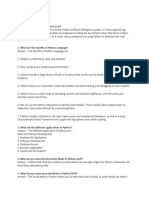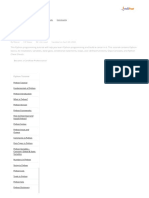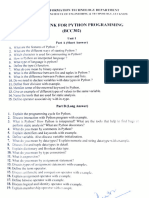0 ratings0% found this document useful (0 votes)
2 viewsPython_Basics_Questions
The document consists of a series of questions covering fundamental concepts of Python programming, including its nature as a compiled or interpreted language, portability, high-level features, variable declaration, indentation importance, reserved keywords, data types, comments, arithmetic operators, type conversion, and user input. Each section poses specific questions aimed at testing knowledge and understanding of Python's syntax and functionalities. The questions are structured to facilitate learning and reinforce key programming principles in Python.
Uploaded by
rajsinghan388Copyright
© © All Rights Reserved
Available Formats
Download as PDF, TXT or read online on Scribd
0 ratings0% found this document useful (0 votes)
2 viewsPython_Basics_Questions
The document consists of a series of questions covering fundamental concepts of Python programming, including its nature as a compiled or interpreted language, portability, high-level features, variable declaration, indentation importance, reserved keywords, data types, comments, arithmetic operators, type conversion, and user input. Each section poses specific questions aimed at testing knowledge and understanding of Python's syntax and functionalities. The questions are structured to facilitate learning and reinforce key programming principles in Python.
Uploaded by
rajsinghan388Copyright
© © All Rights Reserved
Available Formats
Download as PDF, TXT or read online on Scribd
You are on page 1/ 2
Python Basics - Questions
Compile
1. Is Python a compiled or an interpreted language? Explain.
2. How does Python execute a script differently than C or Java?
Portable
1. What makes Python a portable language?
2. Can a Python program written on Windows run on Linux without modification? Why?
High Level
1. What does it mean for Python to be a high-level programming language?
2. How does Python abstract low-level memory management from the user?
print()
1. How do you print 'Hello, World!' in Python?
2. What happens if you use print() without any arguments?
Variables
1. How do you declare and assign a variable in Python?
2. Can a variable name start with a number? Why or why not?
Indentation
1. Why is indentation important in Python?
2. What will happen if indentation is not used properly in a Python script?
Reserved Keywords
1. What are reserved keywords in Python? Give two examples.
2. Can you use a reserved keyword as a variable name? Why?
Data Types
1. List the main data types in Python.
2. What is the difference between mutable and immutable data types?
Comments in Python
1. How do you write a single-line comment in Python?
2. How do you write a multi-line comment in Python?
Arithmetic Operators
1. What are the basic arithmetic operators in Python?
2. How do you perform exponentiation in Python?
Type Conversion and Type Casting
1. What is the difference between implicit and explicit type conversion?
2. How do you convert a string '10' into an integer in Python?
Input in Python
1. How do you take user input in Python?
2. What data type does the input() function return by default?
You might also like
- 9. Introduction to Python Class 9 Questions and AnswersNo ratings yet9. Introduction to Python Class 9 Questions and Answers4 pages
- Class 9 Python Question Answers For Theory ExamNo ratings yetClass 9 Python Question Answers For Theory Exam4 pages
- I PUC CS Chapter 5 Getting Started With Python FinalNo ratings yetI PUC CS Chapter 5 Getting Started With Python Final30 pages
- Become A Python Developer in 45 Days - BababaanaNo ratings yetBecome A Python Developer in 45 Days - Bababaana21 pages
- WWW Interviewbit Com Python Interview QuestionsNo ratings yetWWW Interviewbit Com Python Interview Questions23 pages
- ECS12003 Problem Solving and Python ProgrammingNo ratings yetECS12003 Problem Solving and Python Programming13 pages
- Python Programming For Beginners: Python Programming Language TutorialFrom EverandPython Programming For Beginners: Python Programming Language TutorialNo ratings yet
- Python Handbook For Beginners. A Hands-On Crash Course For Kids, Newbies and Everybody ElseFrom EverandPython Handbook For Beginners. A Hands-On Crash Course For Kids, Newbies and Everybody ElseNo ratings yet



























































